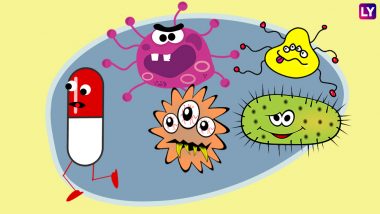World Antibiotic Awareness Week 2018: What is Antibiotic Resistance and How You Can Prevent It.
Before the advent of antibiotics, dying from diseases like pneumonia, tetanus and diphtheria was common. In 1928, the first antibiotic penicillin was discovered by Alexander Fleming, a professor at St Mary’s Hospital in London. And with it, the medical world was revolutionised. Diseases that were once feared could now be tamed, not with elaborate potions or poultices but with simple pills. There’s no surprise why the discovery of antibiotics has been called the most monumental breakthrough in the history of medicine. But antibiotics like any other therapeutic tool wasn’t free from the potential of abuse. Even Fleming himself expressed his fear regarding antibiotics overuse, saying that there will be a time when the public will demand the drug, leading to an era of abuse. World Antibiotics Awareness Week 2018: How to Take Antibiotic Medicines To Prevent Side Effects Like Diarrhoea.

Antibiotic resistance (Photo Credits: File Image)
What are Antibiotics?
Antibiotics are drugs that fight infections by killing pathogens such as bacteria. Bacteria are single-celled organisms that are found on human bodies. While many coexist peacefully with the host and offer many benefits, some can be harmful and disease-causing. World Antibiotics Awareness Week 2018: Themes and Objectives of The Week Dedicated To The Medicine and Antibiotic Resistance.
Antibiotics help in tackling such harmful bacteria by making it difficult for them to proliferate.
What is Antibiotic Resistance?
According to the World Health Organization (WHO), antibiotic resistance occurs when bacteria change in response to the use of the drugs. Eventually, they become resistant to the drug, and the infections caused by them become difficult to cure.Your Antibiotic Abuse is Taking India to a Primitive Age Without Antibiotics, Says Experts.
The culprit is abuse and overuse of antibiotics. When someone takes an antibiotic drug, the vulnerable bacteria dies. But some are resistant to the drug, which survive and multiply, giving rise to a resistant batch of bacteria that can’t be harmed by antibiotics. Repeated and reckless use of antibiotics gives rise to drug-resistant bacteria. Counter Antibiotics with Probiotics.
According to the Center for Diseases Prevention and Control, bacteria can neutralise an antibiotic, reducing its effectiveness. Others learn how to pump the medicine out of their system, before it affects them. Some bacteria even change their outer structure so that the antibiotics cannot attach and kill them.
Even if one bacteria survive the antibiotic attack, it can pass on its resistance to other bacteria.

Antibiotic resistance explained (Photo Credits: Wikimedia Commons)
Why is Antibiotic Resistance Dangerous?
According to WHO, antibiotic resistance poses a serious threat to global health, food security and development. Diseases that were once treated by antibiotics like pneumonia, salmonellosis, tuberculosis and salmonellosis are becoming increasingly harder to treat due to antibiotic resistance.
Antibiotic-resistant bacteria difficult and expensive to treat, often leading to disability and death. Experts opine that rampant abuse of antibiotics can take humanity back to a time where antibiotic does not exist.
How To Prevent Antibiotic Resistance?
Antibiotics are needed only when the infection is caused by a bacteria. Diseases like tuberculosis, pneumonia, sepsis, etc. can be controlled with antibiotics. But even some bacterial infections don’t require antibiotics, like sinusitis.
The drugs can also be used for people who are at high risk of infections, including patients with end-stage kidney disease or those undergoing chemotherapy.
Antibiotics don’t work when the pathogen is a virus. That’s why, it’s foolish to take them when you have cold, flu or bronchitis – diseases caused by viruses. Here are some steps to remember while taking antibiotics:
- Follow your doctor’s prescription to a T.
- Take the antibiotics only till the given time.
- Never skip doses.
- Throw away leftover medicine.
- Never treat viral infections with antibiotics.
- Never ask your doctor to prescribe antibiotics.
- Never self-medicate with antibiotics.
- Never share antibiotics or prescribe it to someone else.
- Wash hands and maintain good hygiene to minimise infections.
- Prepare food hygienically and separate cooked from the uncooked.
The repercussions of antibiotic resistance can be devastating. Efforts of scores of scientists and researchers are undone by it. Organ transplant, chemotherapy and surgeries have become much riskier due to the looming danger of antibiotic resistance. Steps should be taken at multiple levels to reduce the impact and limit the spread of the resistance.

